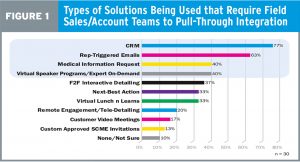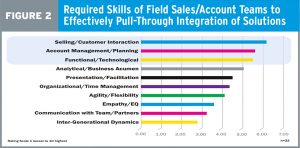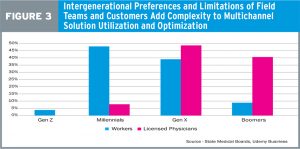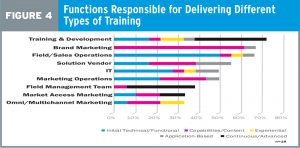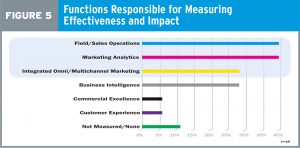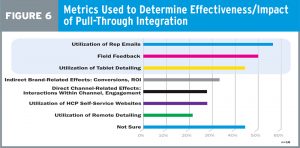Upskilling the Multi-Channel Field Team: Whose Job Is It?
Feature Story – By Kristin Scott
As solutions become more sophisticated, training curricula should evolve to incorporate new skills and competencies.
The use of technology solutions focused on healthcare providers (HCP) and requiring pull-through integration from field sales and account management teams is growing. This means that field teams are increasingly deciding which channel to access based on company data, customer preference and their own abilities and preferences.
But who within the commercial operations team is ensuring that teams have the skillsets to truly optimize the sophisticated tools? TGaS Advisors surveyed life science leaders from commercial learning and development, field/sales operations and omni channel marketing to find out.
Customer relationship management (CRM) and rep-triggered email are the most often employed customer-focused solutions requiring field sales and account teams pull-through integration. (Figure 1)
As solutions other than CRM (such as remote engagement/tele-detailing, virtual lunch-and-learns and next-best action) gain utilization and become more sophisticated, training curricula should evolve to incorporate new skills and competencies.
Respondents rated the top three skills required to effectively pull through integration of solutions as selling/customer interaction, account management/planning and functional/technical. (Figure 2)
Ninety-five percent are training on how to use, but fewer than 50 percent are offering application-based, experiential or continuous training on the nuances involved with understanding each customer’s practice setting, preferences and predicted response, and integrating the business acumen with the technology as the customer relationship progresses.
Interestingly, business acumen was not rated among the top three skills required, but was listed as the most urgent change needed to optimize multichannel integration pull-through moving forward.
The role of “soft skills” that received relatively lower ratings might be worth monitoring as the complex matrix of technological preferences and limitations within generational spans of field and account teams, customers, omnichannel marketers and trainers continues to grow. (Figure 3)
Currently, there are many hands in the pot and not much evidence of a comprehensive strategy to make sure the expectations of the field teams are clear to everyone, that the competencies and skills needed are defined or that each functional area understands its role and remit.
- Field/sales operations is primarily responsible for delivering initial/technical training.
- Brands are primarily responsible for delivering capabilities/content training.
- Commercial learning and development and field management are primarily responsible for delivering continuous and advanced training. (Figure 4)
A lack of comprehensive strategy is also reflected in the variety of responses about how organizations are measuring the return on investment (ROI) of these solutions and whose responsibility that is. (Figure 5)
Forty-four percent of respondents were unsure of the metrics being used to determine effectiveness. (Figure 6)
A multi-functional and comprehensive approach to training and measuring impact could improve organizational total ROI.
Challenges to upskilling include leadership, organizational alignment, change management and cross-functional partnerships. All might be addressed by an intentional team-based approach to the organizational purpose and expectations of HCP-focused technology solutions. Each function’s capabilities can then be clarified, and each role’s required competencies identified and supported directly with curriculum design, delivery and measurement.
Kristin Scott is director of learning and development solutions for TGaS, a division
of Trinity. For more information, email Kristin at kscott@tgas.com.

